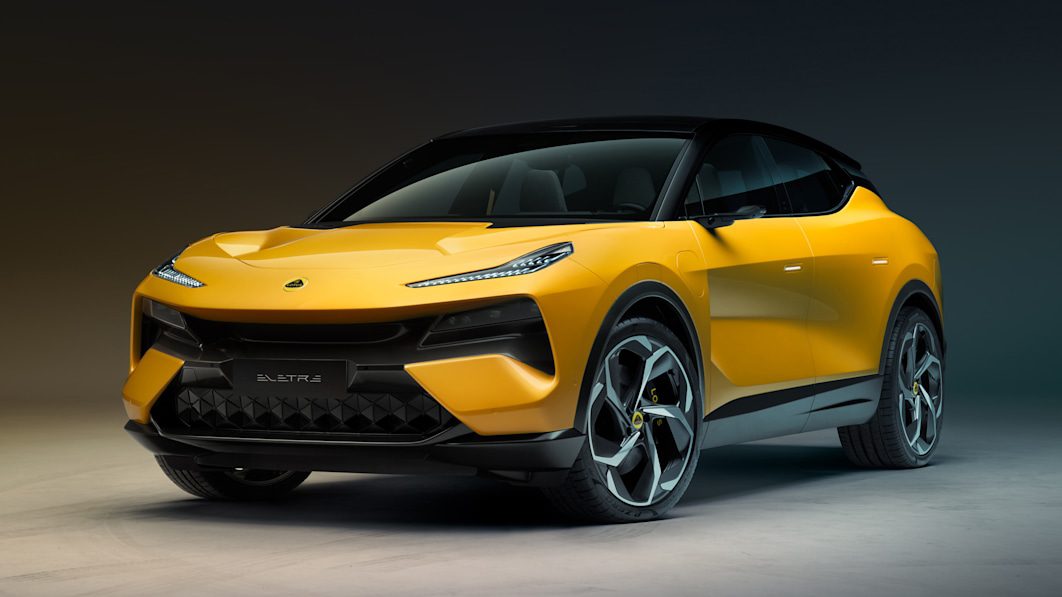Lotus Eletre opens a new front in electric SUVs

Ladies and gentlemen, the new era of Lotus as an EV maker begins with this, the Eletre. It takes elements we’ve seen on the Evija battery-electric hypercar and Emira ICE sports car, wraps them in a larger package, jacks them up, and throws in a lot of new tech for the brand and the market.
Let’s start with size, which is the easy bit. The Eletre is 201 inches long on a 118.9-inch wheelbase, about 79 inches wide, and 64 inches high. Every one of those dimensions puts the Lotus within a couple of inches of the Aston Martin DBX: the EV being a little longer, with a slightly shorter wheelbase, a little wider, and a roof a couple of inches lower.
For us, the side view most closely represents the form we had in mind based on recent spy shots. The front is intense, the yellow of the hero car making the greatest contrast with the polygonal void below. The lights above the leading edge are DRLs and turn signals, the main beams are recessed into that void, hugging the upper edge. The rear, with its Lotus script and full-width light bar fading into triangular intakes along the sides, clearly comes from the sports cars. It can glow in four colors depending on what it needs to communicate, and forms a connection with the light bar across the instrument panel. The SUV proportions and black roof are still playing tricks with our eyes, though; we can’t help feeling the Eletre carries its bulk up high.
The wheels are an optional set of 23-inchers that hide optional 10-piston (ten!) calipers gripping ceramic composite rotors. Lotus isn’t ready to divulge specific battery capacity and motor outputs between those wheels. All we’re told is the pack is more than 100 kWh and output starts at 600 horsepower. Every Eletre is all-wheel-drive, with a motor on each axle.
The 800-volt electrical architecture can handle up to 350-kW fast-charging, 20 minutes at a station at that charge rate restoring 248 WLTP miles of the Eletre’s estimated 373-mile range in WLTP testing. EPA numbers will come eventually. Lotus says the hauler will get to 62 miles per hour in under 3 seconds and hit a top speed of 161 mph.
The electronic side mirror housings each contain three cameras, one camera for the rear views, one to help stitch a 360-degree overhead view, and one to help enable self-driving. The charge port is on the front left fender, but keen eyes might notice more shutlines atop the front wheel arches. Those are for retracting lidar sensors that work with two more lidar sensors in the roof, one at the front, another at the back. These could give the Eletre the kind of autonomous capability not seen on a production car yet.
The interior comes in four- or five-seat configurations. A slim gauge cluster and a head-up display provides the driver with relevant info, front passengers get a similar slim display that can display infotainment options. Between them, a 15.1-inch infotainment touchscreen that lays flat when not in use. Connecting them, a full-width light bar “changes color to communicate with occupants.” Cabin materials include a wool blend for the seats, microfiber for soft-touch points, and recycled carbon fiber. And on top of this being Lotus’ first SUV, here’s a sentence Lotus has never had to write before: “There is a wealth of practical storage space in the Eletre’s cabin,” from storage trays and cupholders to liter-bottle-holders in the doors.
There will be tunes, too. British audio concern KEF provides the standard and optional units, the former being a 1,380-watt, 15-speaker surround sound affair. Upgrade from KEF Premium to KEF Reference and get 2,160 watts run through 23 speakers.
We can’t imagine Lotus lost its way with driving dynamics; we won’t be surprised if the Eletre sets a new bar in the tiny-but-growing segment. The SUV will offer air suspension and active damping standard; active ride height, active rear axle steering, an active anti-roll bar, and torque vectoring via braking will be available. The four drive modes are Range, Tour, Sport, and Off-Road, their elements able to be mixed and matched in an Individual mode. On top of the usual changes to things like steering and dampers, certain modes alter the angle of the three-stage wing in back.
The Eletre is on sale now for a price we’re not privy to at the time of writing. It will be built in the automaker’s new factory in China, deliveries commencing next year. You know who to call if you’re interested.







